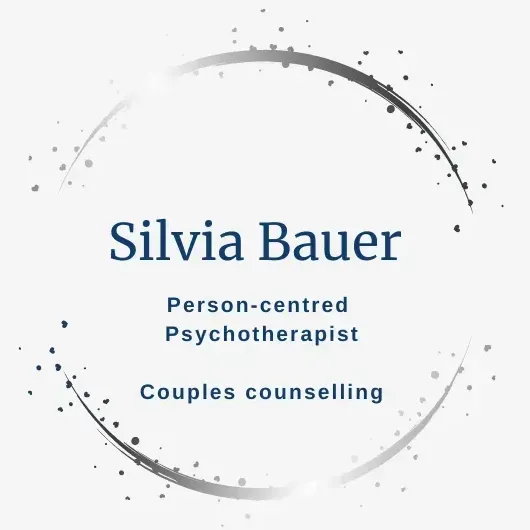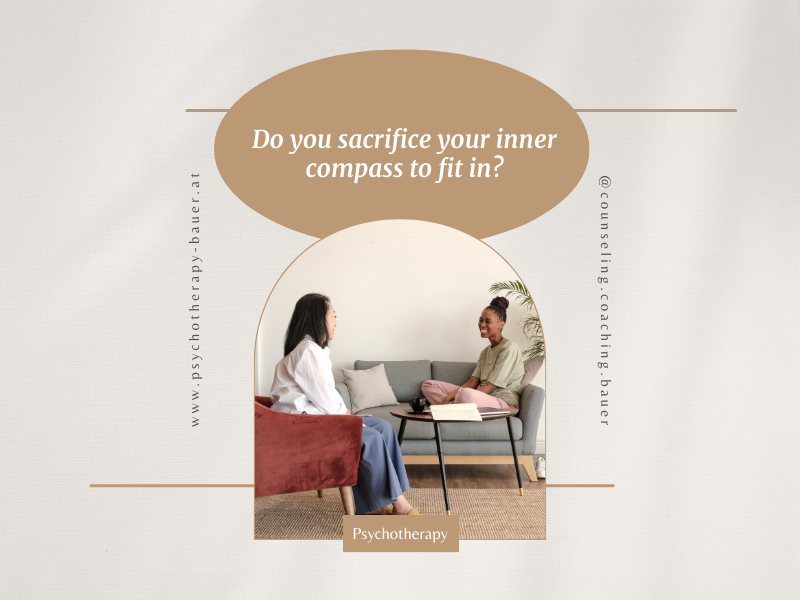5 reasons why counselling with me is NOT right for you
Silvia Bauer • 15 January 2023
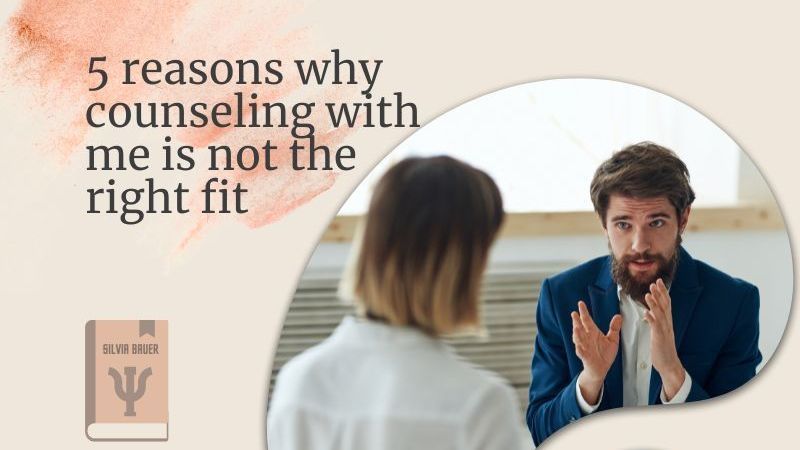
You may have read my blog about the initial session
and you are still uncertain whether counselling with me is the right choice for you. We're all busy people and counselling is an investment in time and money.
Me too I don't want to work with people who are not going to see the benefit of counselling or are just not the right fit for counselling with me.
Here are 5 good reasons why counselling with me might not be the right choice for you:
BUT please do not confuse the question about your want and wish with your belief or trust in your ability to change. It is absolutely NOT required that you believe in yourself neither in your ability to change. It is neither helpful nor necessary that you have "worked it all out".
I wrote another Blog about how many sessions it may take
- but for sure: Psychotherapy does take some time and money.
Obviously, that's at least 65€ on a weekly basis. But as time is money it's actually a lot bigger investment:
It's at least one session a week - plus the time you spend on the way. Many times, you do spend more time with yourself thinking and integrating the experiences and discoveries from the sessions.
Then there is this little nagging question that gets louder by the time "how do you really feel?". Some clients hear or feel it strongly on the way to the session. Not always the most comfortable place to be in, when you realize how you're really feeling. Nevertheless, it's a great place to start caring about your own needs.
Additionally, you may want to start doing some own personal work - that can be practicing mindfulness techniques, searching for a suitable way to symbolize new experiences / inner parts or getting the long-needed doctors/ physical therapy appointments. I outlined this in my Blog "how many sessions do I need?"
The person centered approach suggests People are not pathology. The person can recover by being listened to unconditionally and thus understanding themselves deeply. So there's practically no structure or anything like weekly goals for the session - although most clients do have long term goals they want to work on. But the session is usually more like a movie about your life (past and present) and we are trying to understand it on a deeper level. Usually we are guided by emotional or physical discomfort, and many times behaviour you are questioning or that's leading you into troubles.
Human "being" goes far beyond existing. Finding value in experience and seeing their meanings is what really makes us who we are.
The person centered relationship is not like the relationship of friend to friend.
It follows six main guidelines that enable the opportunity for personal growths:
- the client and counsellor are in contact
- the client is anxious or inconvenient in some way
- the therapist is genuinely aware of their feelings
- the therapist feels unconditional regard towards the client
- the therapist understands the client fully
- the client feels that the therapist understands and accepts them fully
I do provide Email support in case anything came up to you in between sessions. Especially at the beginning questions may come up you need clarification on. That's not an issue. But I don't provide counselling via writing without personal sessions.
We naturally have a gut feeling with whom we can connect best.
Rogers says "every person is an island in itself, in very real sense, and can only build bridges to other islands, if you actually want to be yourself and are willing to allow yourself".
I am NOT suitable for you:
- if you are looking for someone who can solve your problems for you
- if you are looking for the cheapest version of counselling
- if you don't want to invest time on a regular basis (at least one hour per week) in emotional work
- if you don't care about inner experiences and relationship processes, you just want tools
I am suitable for you if
- you see relationships as a way to develop and grow personally
- you understand that there's no quick-fix but lasting results take their time
- you see your personal and emotional development as an investment in your relationships and life-long fulfillment
Me too I don't want to work with people who are not going to see the benefit of counselling or are just not the right fit for counselling with me.
Here are 5 good reasons why counselling with me might not be the right choice for you:
- Do you want to change?
BUT please do not confuse the question about your want and wish with your belief or trust in your ability to change. It is absolutely NOT required that you believe in yourself neither in your ability to change. It is neither helpful nor necessary that you have "worked it all out".
I know that sounds unlikely but it's really one of the big challenges "to let go" of control, fixed ideas, unrealistic goals and unnecessary limitations. So, when you want to change but just can't imagine how on earth that could be possible - you are exactly in the right place.
- Do you want to invest time and money in psychotherapy?
Obviously, that's at least 65€ on a weekly basis. But as time is money it's actually a lot bigger investment:
It's at least one session a week - plus the time you spend on the way. Many times, you do spend more time with yourself thinking and integrating the experiences and discoveries from the sessions.
Then there is this little nagging question that gets louder by the time "how do you really feel?". Some clients hear or feel it strongly on the way to the session. Not always the most comfortable place to be in, when you realize how you're really feeling. Nevertheless, it's a great place to start caring about your own needs.
Additionally, you may want to start doing some own personal work - that can be practicing mindfulness techniques, searching for a suitable way to symbolize new experiences / inner parts or getting the long-needed doctors/ physical therapy appointments. I outlined this in my Blog "how many sessions do I need?"
Personal development and growth are really hard and takes some time - just like the caterpillar who grows in their cocoon before they can turn into a butterfly.
- Do you want to explore your emotions, experiences and behavior
The person centered approach suggests People are not pathology. The person can recover by being listened to unconditionally and thus understanding themselves deeply. So there's practically no structure or anything like weekly goals for the session - although most clients do have long term goals they want to work on. But the session is usually more like a movie about your life (past and present) and we are trying to understand it on a deeper level. Usually we are guided by emotional or physical discomfort, and many times behaviour you are questioning or that's leading you into troubles.
Human "being" goes far beyond existing. Finding value in experience and seeing their meanings is what really makes us who we are.
The person centered relationship is not like the relationship of friend to friend.
It follows six main guidelines that enable the opportunity for personal growths:
- the client and counsellor are in contact
- the client is anxious or inconvenient in some way
- the therapist is genuinely aware of their feelings
- the therapist feels unconditional regard towards the client
- the therapist understands the client fully
- the client feels that the therapist understands and accepts them fully
Rogers states "one of the commonest problems in psychotherapy, is the client's insistence that the counselor take over his (their) problem. Responsibility is most helpfully left with the client." So if you're looking to get solutions for your problems from me - that will not happen. I am rather joining you to discover and elaborate them.
- Do you want to sit face-to-face with a counsellor?
I do provide Email support in case anything came up to you in between sessions. Especially at the beginning questions may come up you need clarification on. That's not an issue. But I don't provide counselling via writing without personal sessions.
- Do you want to work with a female counsellor my age?
We naturally have a gut feeling with whom we can connect best.
Rogers says "every person is an island in itself, in very real sense, and can only build bridges to other islands, if you actually want to be yourself and are willing to allow yourself".
We’ve looked at 5 reasons why counselling with me may not be the right fit for you.
- if you are looking for someone who can solve your problems for you
- if you are looking for the cheapest version of counselling
- if you don't want to invest time on a regular basis (at least one hour per week) in emotional work
- if you don't care about inner experiences and relationship processes, you just want tools
I am suitable for you if
- you see relationships as a way to develop and grow personally
- you understand that there's no quick-fix but lasting results take their time
- you see your personal and emotional development as an investment in your relationships and life-long fulfillment
So now you may have a better understanding of your needs and whether counselling with me is a good fit for you – or have more clarification on what you are looking for.
If it seems right for you, please contact me.
If you're not sure about one or the other point, please reach out for clarification.
We all seek love, yet many of us struggle to deeply connect with others. The surprising truth is that everyone somehow pushes love away—even if we don’t realise it. This blog explores the subtle ways we might be distancing ourselves from love and offers insights into how understanding these behaviours can lead to deeper, more meaningful relationships. If you’ve ever felt frustrated or confused by your actions in love, keep reading—you may discover the key to opening your heart and letting love in.
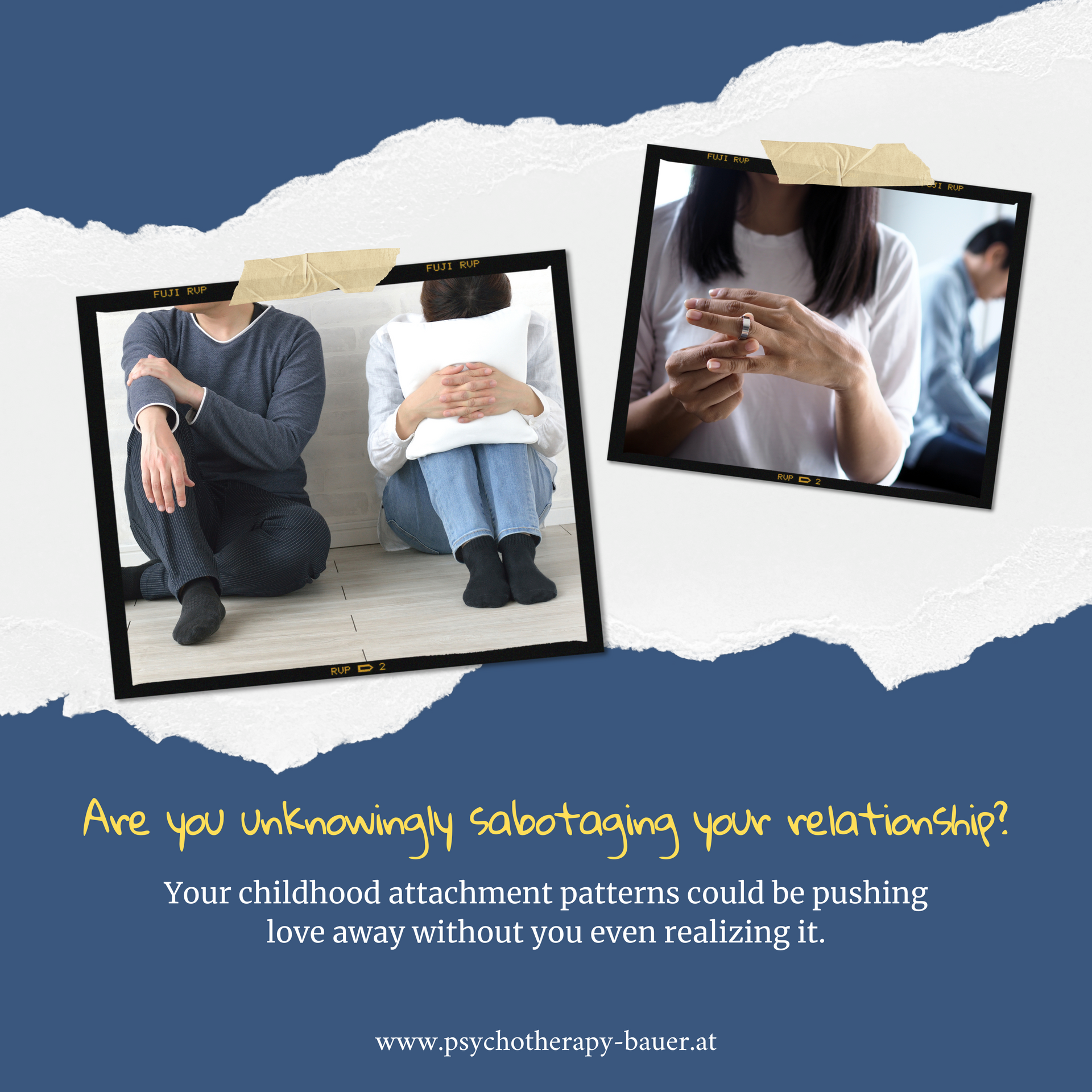
Have you ever noticed yourself acting differently with your romantic partner than with friends? This is because romantic relationships tap into our deepest survival instincts, rooted in our early attachment experiences with caregivers. To avoid unintentionally pushing love away, it is imperative that we learn to recognise how these dynamics play out in adult relationships. This blog explores the powerful link between childhood attachment and romantic behaviour, providing insights on how to build healthier, more loving connections with your partner.
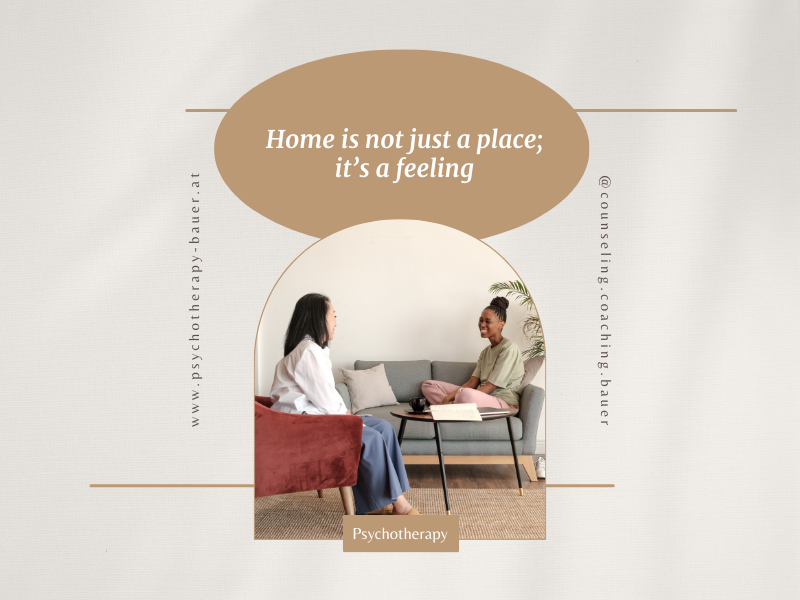
I have just moved my private practice. Although it’s not been very far, and I haven’t moved any furniture, it hasn’t been the easiest step for me to take. Moving houses brings up a lot of associations – and I assume not just for me, as there are plenty of sayings about the meaning of home. Besides obviously “home sweet home," the idea “home is not just a place, it’s a feeling” really hit home for me. Indeed, it is a feeling, and this “feeling of home” doesn’t necessarily have to be connected to the outside place, but just like any other feeling, it needs to be taken care of and be nourished. And well, some places are more in line with our feeling of home than others. I’ve had my private practice in the same place since 2018, and I quite liked it. You may have seen the fabulous view from the top roof in the heart of Vienna. There was nothing wrong with it, and when the new place popped into my awareness, I couldn’t pinpoint what made me decide to move, despite certainly many apparent facts that weren’t in line with my experience. “On ne voit bien avec le coer, l’essentielle est invisible pour les yeux” / “It is only with the heart that one can see rightly; what is essential is invisible to the eye” (Antoine de Saint-Exupery).
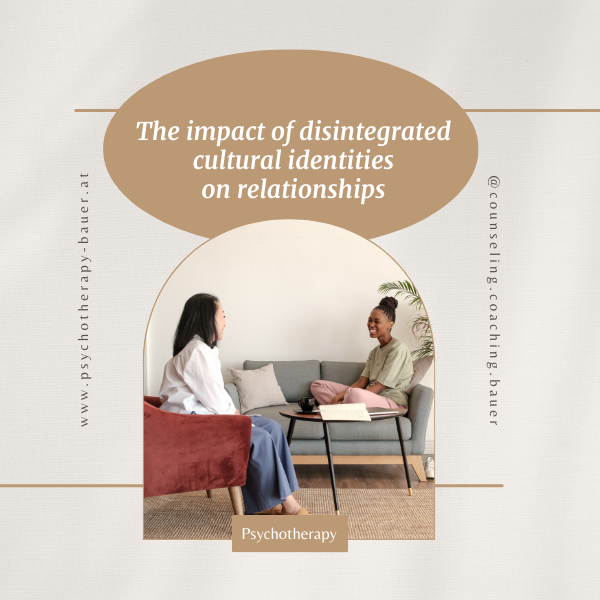
For most of my clients (including myself), cultural integration isn’t an obvious topic in everyday life. We’re fitting in and are used to belonging to one or the other community – usually not at the same time. It looks like one day – or even moment – we have one cultural identity and the next day another. We’re adapted either way and that’s just the way it is. It looks needless to give it another thought . . . Unfortunately, there are shiny moments that suddenly arise out of the blue and give a little painful stitch right into the heart. It’s a friend who completely forgot that most of the people outside are speaking German. And it can be a comment on my accent that keeps coming up. On such occasions, I feel slightly inadequate, I notice that there’s a part of me not seen by most people, even forgotten by my dearest friends. Looks like I’m well-integrated. Do you relate to and recognize those moments in your life when the second part of your cultural identity knocks at the door? If so, something is waiting to be integrated. And to make it even more confusing there’s a funny paradox between integration on the outside and inside yourself: the best-integrated people on the outside have many times chosen a shortcut and adapted to the cost of leaving parts of their cultural heritage behind.
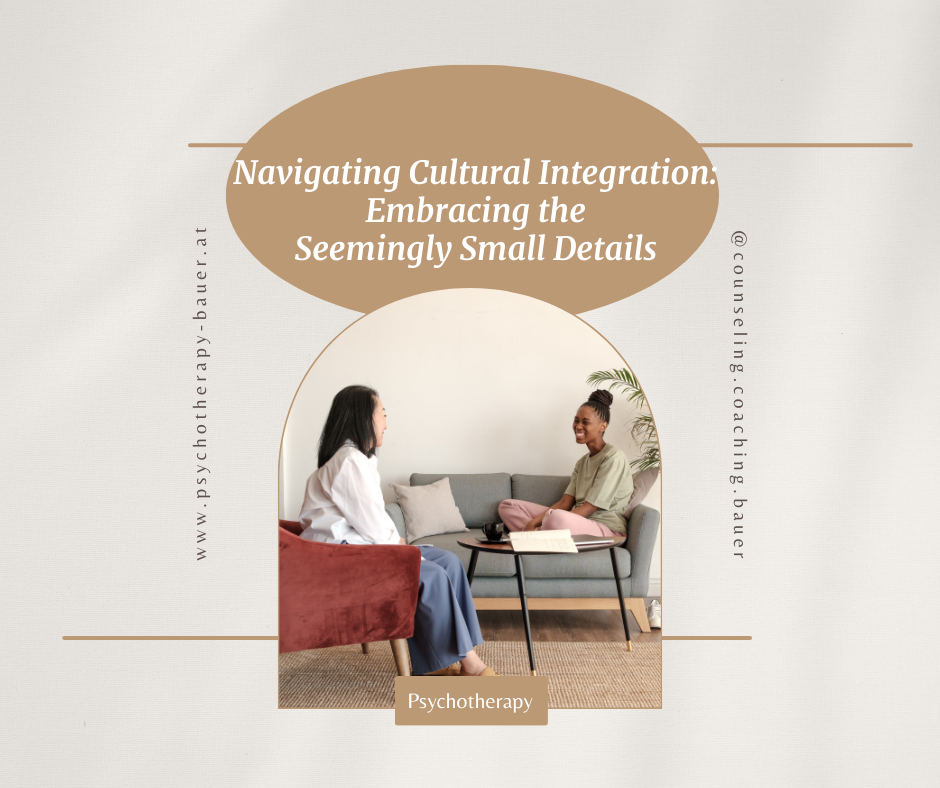
Integration is a difficult topic one could easily get lost in. That’s why I want to take it to a more personal level. I’m talking about the seamless little details in everyday life, like drinking coffee or tea. Following up on them might lead us to a cultural and historical tradition like Vienna Coffee houses and English Tea time. Are you familiar with the struggles of juggling two diverse cultural traditions? The longing to belong to two (maybe even conflicting) cultures? If so, this blog is for you. And if, for whatever reason, it’s not so much your topic, but you’re close to a person with whom it resonates, chances are, you may benefit from understanding your person on a much deeper level.
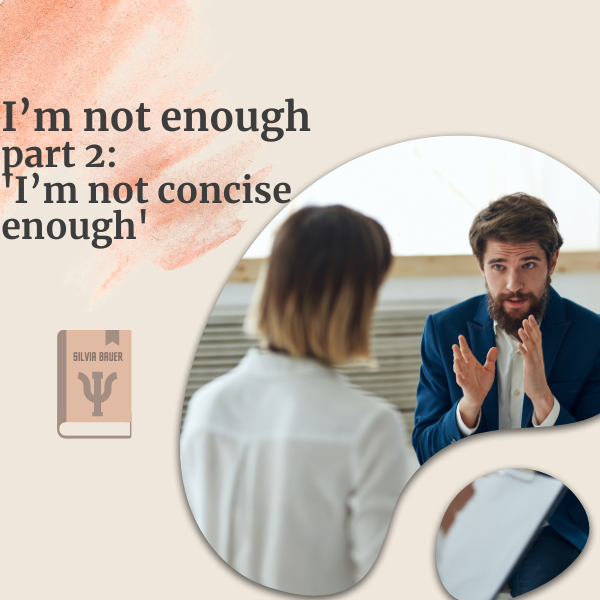
I Won’t Go Speechless by Princess Jasmine (Naomi Scott) Here comes a wave meant to wash me away A tide that is taking me under Swallowing sand, left with nothing to say My voice drowned out in the thunder But I won't cry And I won't start to crumble Whenever they try To shut me or cut me down I won't be silenced You can't keep me quiet Won't tremble when you try it All I know is I won't go speechless 'Cause I'll breathe When they try to suffocate me Don't you underestimate me 'Cause I know that I won't go speechless
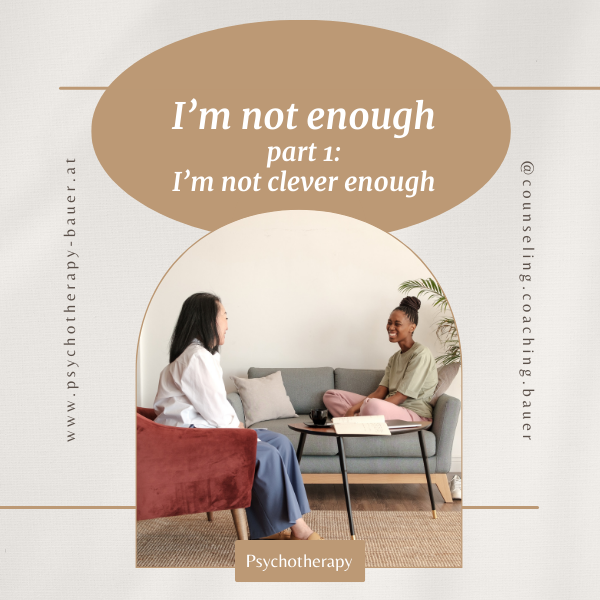
Today, I’m talking about a very common topic. It’s more familiar in my daily life than my neighbours: I’m not enough. About every second client session, I get to meet with one of the countless varieties of this idea. One that I honestly relate to is “I’m not smart enough”. Two days ago one of my clients brought it up while reviewing the results of her cognitive ability diagnostics with an IQ above 130. The version I encountered yesterday was “I am not concise enough” and “I am too messy to speak up”. Do you relate to this next logical step as well? “I am too ... to be seen.” And therefore “honestly, I’m so not enough that I’m unlovable. I feel ashamed and better shut up.” What a sad and lonely place to be in. I feel so sorry for this kind of suffering and as well a bit fed up. I know and understand how hard it is for each and every one of us to deal with the feeling of not being ... enough. And looking at society I’m a bit upset about all the places that support ideas of not being strong/smart/hardworking/skinny/pretty/young..... enough. From this place, I would like to shout out and warn you “Be careful who you surround yourself with”. There are certainly some environments that benefit from people who don’t feel ...enough.
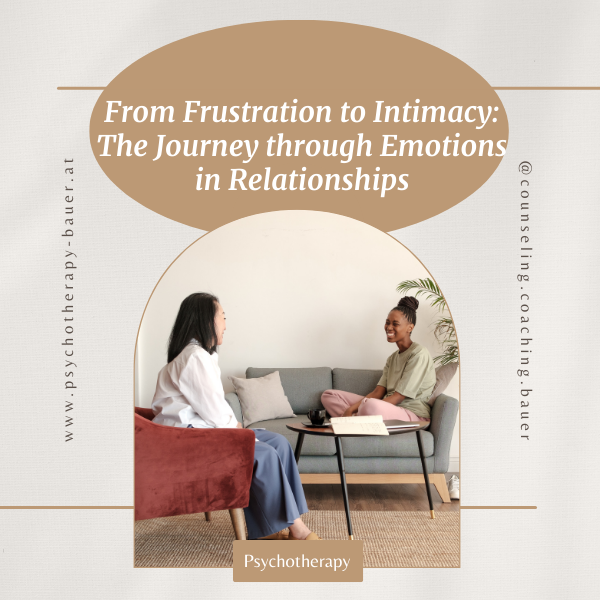
Hello and welcome to my blog on the role of emotions in relationships. Today, when I speak about relationships, I'm mainly focusing on our primary attachment relationships, commonly referred to as our partnerships or relationships with our spouses. However, you'll notice similar patterns in other profound relationships, where attachment behaviour becomes more evident. The depth of a relationship often amplifies our attachment behaviours, a phenomenon observed from early childhood and persists throughout our lives. It's crucial to understand that what may be perceived as “childish” behaviour is, in fact, inherently human. Have you ever noticed that some emotions make it easier to connect to your spouse than others? I assume that you are well aware that your partner either gets upset or shuts down when they feel criticized or annoyed. Maybe you’re also struggling with feeling ashamed at times and noticed that it leads you into a pretty lonely place. More often than not, when it comes to facing difficulties with our partners, we end up feeling shameful and are very much afraid of being lonely and left alone . And on the contrary, there is sadness as Disney Pixar elaborated in “Inside Out” which has the innate ability to bring people together and connect on an even deeper level. So, how come some emotions bring us together while others keep us in a lonely place? Well, each of them has their job to fulfil. I will expand on this below, and you’ll see why it’s worth doing some emotional work…
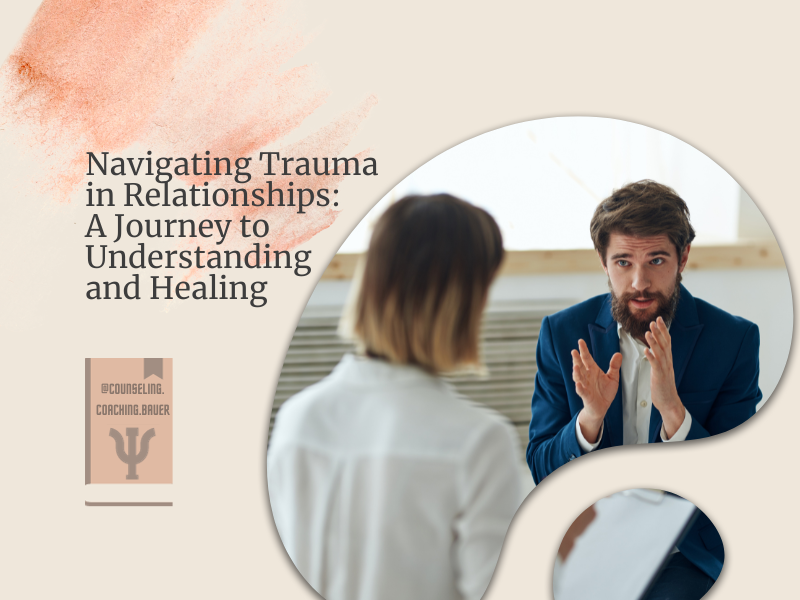
The threads of trauma and their far-reaching impact on relationships can be complex and challenging to deal with. Whether you've been diagnosed with a trauma-related disorder, find yourself grappling with the weight of depression, or notice behavioural patterns hindering your connection with your emotions, this blog post is written for you. Have you ever felt concerned about how your struggles might cast a shadow on your relationship? Perhaps your partner has expressed frustration, dismissing the echoes of the past as irrelevant and labelling your reactions as "overreactions." In the realm of relationships, there exists a widely common pattern of a partner who turns away, leaving their significant other unseen in the wake of their trauma. Although they usually fear being faced with their loved one's painful emotions, being left behind by a significant other in their pain is a disconcerting experience for humans – no matter what age.


